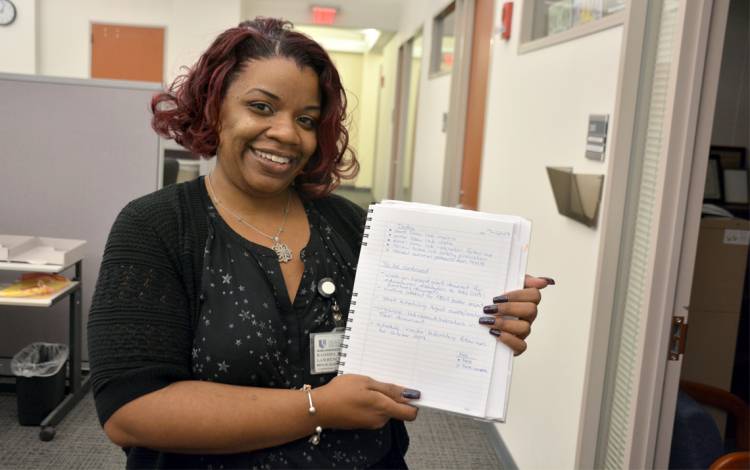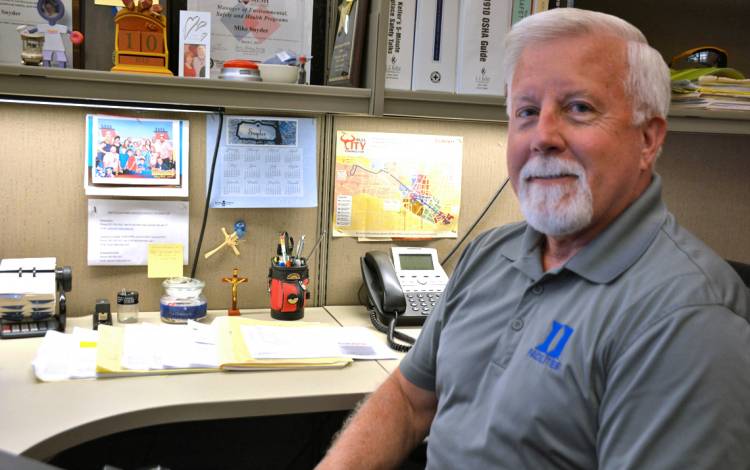How to End Your Day on a High Note
Make a to-do list, declutter your space and decompress between work and home

Frank Turcotte, a clinical nurse with Duke’s Hyperbaric Medicine Clinic, finishes each day with a drive home that lasts about 45 minutes.
His drive, which begins on the crowded streets around Duke University Hospital but eventually gives way to winding country roads near his Alamance County home, is time well spent for Turcotte.
“Some people think the longer commute can be more stressful,” Turcotte said. “And it can be at times. But I’d say it can also be a benefit. You have time to decompress before you get home. You’re not bringing your work home with you.”
The way you end your workday and transition to your personal life can play a large role in how refreshed you feel the next day and in other parts of your life and your overall well-being. Whether finding peace on your drive home or taking a moment to create order in your workspace before the next day, we explore some ways Duke employees end their day on a high note.
“It’s important to have a way to clear out the things that you’re carrying with you during your day and to shift your mind out of emails and into something that represents more your time with yourself,” said Noga Zerubavel, Duke assistant professor in Psychiatry and Behavioral Sciences.
Make a to-do list

Rashida Lawrence, safety and health specialist for Duke University Health System’s Laboratory Safety Division, has a standing appointment at 3:45 p.m. to craft a to-do list for the next day of work.
Before she leaves work at 4 p.m., Lawrence writes down emails she needs to send, hygiene plans to review and safety evaluations to complete the next day.
“I feel much better leaving for the night if I’ve emptied my head of everything I need to do,” Lawrence said. “My plans for work are already in place for the next day.”
Lawrence began keeping a to-do list after taking the Learning & Organization Development course “Managing Multiple Priorities” this year. She picked up tips for managing her to-do list like updating it at the end of the day, organizing tasks by highest to lowest priority and jotting down quick tasks like making a phone call.
“At the end of work, our minds are shifting toward our responsibilities at home,” said Joy Birmingham, assistant director of leadership and professional development for L&OD. “Making a to-do list before leaving work is like putting a bookmark in your workday. It’s a way of tying up loose ends, so you can reduce the mind-clutter that could follow you home.”
Declutter your space

Mike Snyder has a ritual before leaving work every evening.
Snyder, safety manager for Duke Facilities Management, scoots his chair under his desk, places scattered pens in their rightful place and organizes the dozen or so safety-related reports and tasks on his desk. He places these documents into two neat piles, one for tackling and monitoring the next day, the other for pending action.
“I head home feeling positive when I have all of my belongings squared away,” he said. “It’s my way of having control. I can neatly see what I’ve accomplished and what I need to work on the next day.”
Tom Szigethy agrees that organizing your workspace at the end of the day is a positive habit. Szigethy, associate dean of students and director of Duke’s Student Wellness Center, said it’s hard to focus when desks are cluttered.
“A clean workspace allows you to hit the ground running when you get to the office,” Szigethy said. “You don’t waste your energy trying to make sense of the clutter or finding that important document.”
Focus on Positives

In her role as director of DukeReach, which helps students who are navigating complex or challenging situations, Amy Powell occasionally instructs students facing such difficulties to practice mindfulness. The idea is that, by staying in the moment and clearing the mind of negative distractions, the practice can help to reduce stress.
Over the course of her workday, Powell said she tries to practice mindfulness herself by creating and appreciating moments of happiness such as occasional lunches with friends or shared laughs with co-workers.
“I’m not extremely intentional about it, but I think that, sometimes when you have a difficult job, that’s what you have to do,” said Powell, Duke’s Associate Dean of Students. “It’s important to appreciate the positive parts of the day.”
Before you leave work, pause to take stock of positive aspects of your day or the value of the work you did. This habit can help end the day on an emotional upswing and shed some stress that might otherwise follow you home.
“I know, at the end of the day, we’re doing good work and that’s important,” Powell said. “While we might be dealing with hard things, I believe that we are making an impact, and that’s what keeps me going.”
A Buffer Between Work and Home

For Frank Turcotte, the drive between work and home serves as his buffer zone between the pressures of work as a clinical nurse with Duke’s Hyperbaric Medicine Clinic and his life at home.
“I feel that it helps reset my mind,” Turcotte said of his commute which takes him through scenic farmland. “You’re distracted from things you may be dealing with at work. In nursing, we’re dealing with life and death. Sometimes the drive can be a great time to reflect on life because you’re seeing life all around you in the flowers and trees and greenery.”
According to Noga Zerubavel, assistant professor in Psychiatry and Behavioral Sciences at Duke, it’s important to have post-work activities – such as taking a walk, changing clothes or listening to music – that serve as a psychological demarcation between work and home. It’s a way to draw a distinction between the two parts of your day and help ensure that stress from one doesn’t encroach on the other.
“I’ll feel like I’ve left work behind,” Turcotte said of his post-commute mindset. “I’ve enjoyed what I’d done that day and felt like I accomplished something. And then you get home and your focus changes to your family or whatever activities you’re going to do that day.”
Have a story idea or news to share? Share it with Working@Duke.